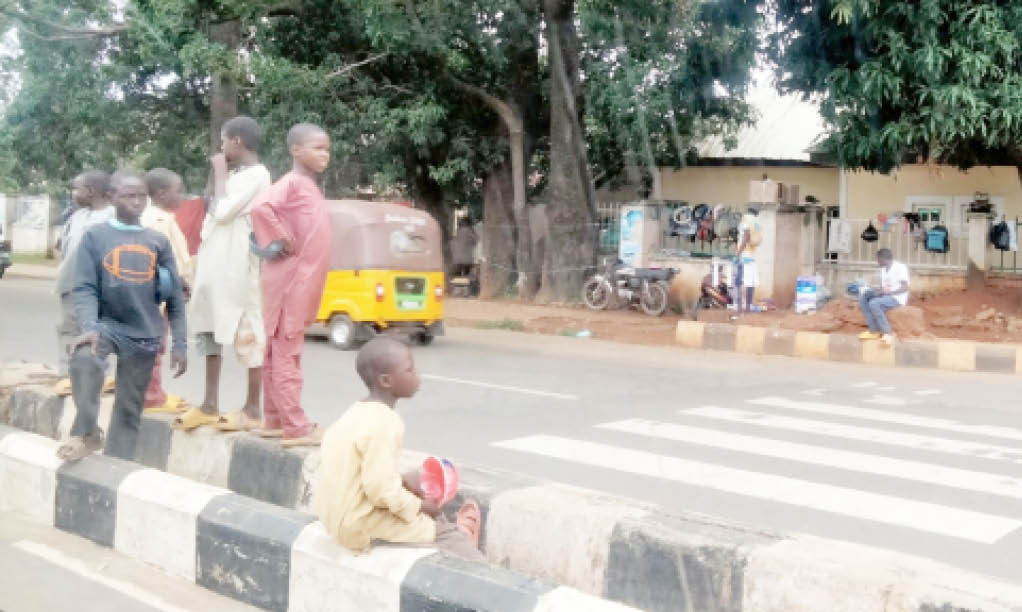Across Nigeria’s towns and cities, the sight of children scavenging through dumpsites, garages, and street corners has become disturbingly common. These children, often referred to as “Baban Bola, or Jari Bola” spend their days with tattered plastic bags slung over their shoulders, searching for scraps of iron, plastic, or any item of value that can be sold. For many, scavenging is not just a survival tactic but their sole means of supporting themselves or their families. This silent crisis is not only robbing these children of their potential but also contributing to the decay of Nigerian society.
These children, many of whom are aged between 12 and 19, are caught in a cycle of poverty, exploitation, and neglect. Some are orphans or Almajirai who have turned to scavenging as an alternative to begging for food. Others are forced into this harsh reality by the crushing poverty of their families. Instead of sitting in classrooms and dreaming of a better future, their days are consumed by the struggle for survival. Tragically, this cycle often leads to lives marred by poor health, illiteracy, and despair.
The consequences of this crisis extend far beyond the children themselves. As the streets of Nigerian cities become increasingly stripped of recyclable materials, many scavengers now resort to stealing public and private property to sustain their activities. Gates, window frames, streetlights, solar installations, and even the iron covers of wells and drainage systems have become targets. Entire communities are left vulnerable as fences and public infrastructure are destroyed. Electricity lines, transformers, and other essential utilities are routinely vandalised, leaving households and businesses in darkness and jeopardising economic activity.
This wave of destruction feeds into a broader societal issue. With limited education and no viable opportunities for gainful employment, many of these children become entangled in crime. The transition from scavenging to theft is seamless for some, while others fall victim to drug abuse, using substances to numb the pain of their grim realities. Reports of young scavengers running mad at an early age are not uncommon, yet their plight often goes unnoticed or ignored. These children, left to fend for themselves, are Nigeria’s forgotten generation, cast aside without care, protection, or opportunity.
- Make the free CS initiative real
- Trade facilitation: Senate committee offers support to APM Terminals
Education offers the most powerful solution to break this vicious cycle. It is not just a tool for individual transformation but also a means of safeguarding the broader community. A child in school is far less likely to engage in theft, vandalism, or drug abuse. Education equips children with the skills, knowledge, and confidence to build a better future, transforming them from burdens on society to its greatest assets.
The National Commission for Almajiri and Out-of-School Children has a pivotal role to play in addressing this crisis. Established to cater to the specific needs of Nigeria’s most vulnerable children, the commission is well-positioned to provide both strategic leadership and actionable solutions. Firstly, it can work to strengthen the Universal Basic Education (UBE) programme, ensuring that it is free, inclusive, and accessible to all children. By collaborating with state and local governments, the commission can facilitate the establishment of community-based learning centres to reach children in remote and underserved areas.
The commission can also spearhead reintegration programmes for scavengers and other out-of-school children, providing bridge education that prepares them to transition into formal schools. For older children, vocational training programmes aligned with market demands can offer a viable pathway to employment, helping them move away from scavenging and its associated dangers.
The commission under the supervision of federal and states ministries of education can lead public awareness campaigns to educate communities about the value of education and the dangers of child labour. By engaging with traditional and religious leaders, it can build grassroots support for policies that prioritise education. Partnerships with non-governmental organisations and the private sector can also be leveraged to fund initiatives and expand outreach.
Additionally, the Nigeria government can advocate for legislative reforms to enforce compulsory education and regulate child labour through the establishment of National domestic workers protection agency. It can collaborate with law enforcement agencies to protect public infrastructure and address criminal activities associated with scavenging. Conditional cash transfer schemes, managed or supported by the commission, can provide financial relief to families, ensuring that sending their children to school is a viable option.
The children who scavenge Nigeria’s streets today are not just symbols of neglect; they are warnings of a society that has failed to invest in its future. Their plight threatens the stability, security, and progress of the entire nation. By prioritising education, and with the committed efforts of the National Commission for Almajiri and Out-of-School Children, we can transform “Baban Bola” from scavengers into scholars, from a problem into a promise.
This transformation will not happen overnight, but it is essential for Nigeria’s long-term growth and stability. Investing in the education of these children is not just an act of compassion, it is a strategic imperative. The time to act is now, to rescue a generation from despair and provide them with the tools to build a brighter, safer, and more prosperous Nigeria. Through education, we can ensure that the streets no longer define their futures. Instead, they can look forward to lives of dignity, purpose, and opportunity.
Mukaddas can be reached via [email protected]

 Join Daily Trust WhatsApp Community For Quick Access To News and Happenings Around You.
Join Daily Trust WhatsApp Community For Quick Access To News and Happenings Around You.


